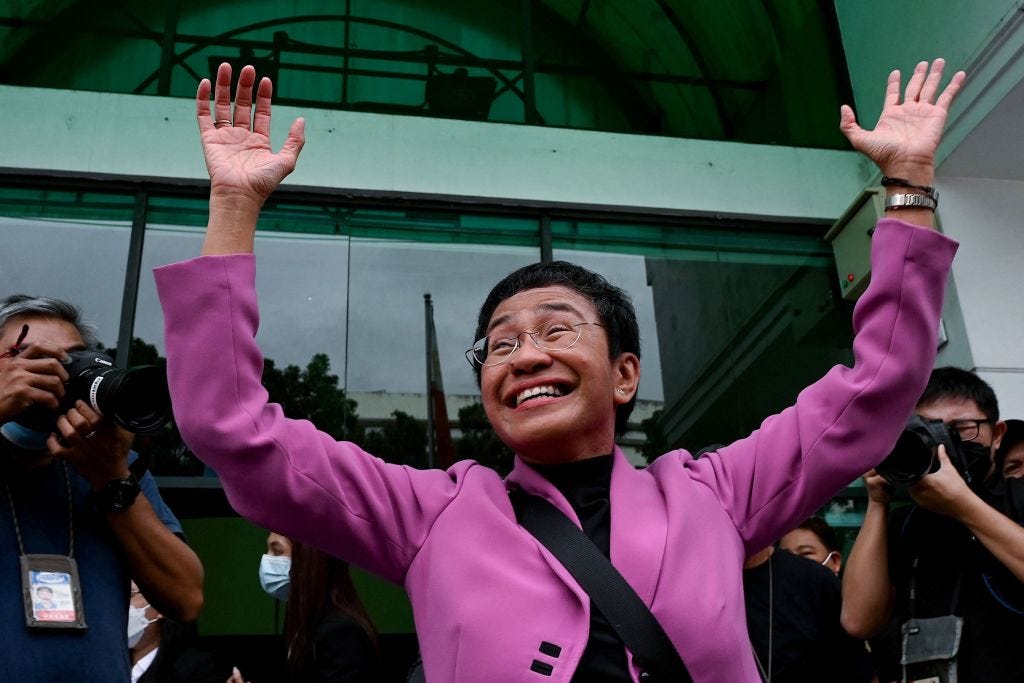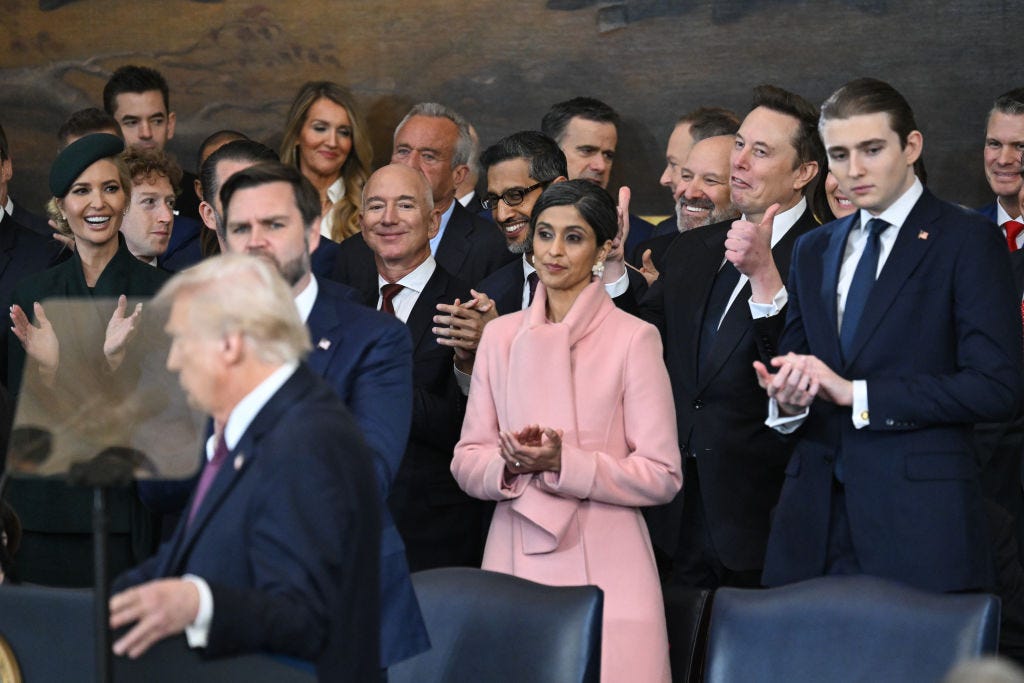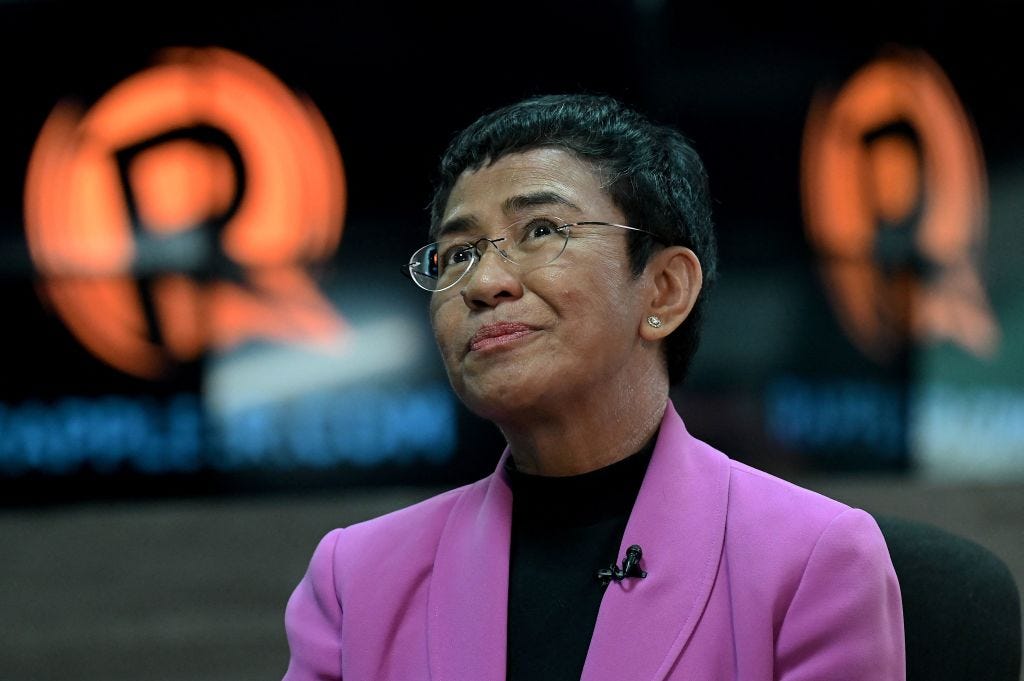'America Is Moving Into Hell,' Says Nobel Laureate Who Stood Up to a Dictator
The US under Trump is a 'hop, skip, and a jump away' from the Philippines under Rodrigo Duterte, says acclaimed journalist and Peace Prize winner Maria Ressa.
Donald Trump has begun his second presidency precisely as Americans concerned about preserving democracy and the rule of law had feared. He pardoned or commuted the sentences of 1,500 participants in the deadly Jan. 6 insurrection he incited four years ago in an attempt to overturn his defeat for re-election.
That frees Trump-aligned extremists to commit political violence on his behalf again. Combined with other initial steps taking aim at those he claims “weaponized” the federal government against him, the first convicted felon to occupy the Oval Office has signaled his quest for the unchecked power that our founders designed the US constitutional system to prevent.
The journalist Maria Ressa understands the threat authoritarian leaders pose to democratic societies as well as anyone. A citizen of both the United States and her native Philippines, Ressa shared the Nobel Peace Prize in 2021 for her work safeguarding freedom of expression from a Filipino government marked by brutality and attacks on the independent press – including multiple criminal charges lodged against her.
Born in Manila and educated at Princeton, Ressa, 61, straddles the two countries in her work as CEO of the Filipino news site Rappler and professor at Columbia University’s School of International and Public Affairs. Her 2022 memoir, How to Stand Up to a Dictator, has gained wide currency amid threats to democracy that have gathered momentum around the world.
I spoke to Ressa last week about the prospects for the new Trump administration, the role of large technology companies in fueling populist anger, and whether journalism remains a viable check on government power. Ressa warned that the US now stands just “a hop, skip and a jump” from the sort of repression that beset her native country beginning with the ascension of President Rodrigo Duterte in 2016.
Here’s more from our conversation, edited for clarity and brevity:
You won the Nobel Prize, which is about as great an honor as somebody can receive in this world. The temptation is to think well, once you’ve received that award, your problems are no longer present. But as I read from your book, you remain under criminal charges. You don’t know if they’ll ever be prosecuted and wreck your life. Tell me what freedom you have to operate right now.
RESSA: In the Philippines, we’ve moved from hell, which is when we had like up to 30,000 people killed in three years, to purgatory. And the criminal charges against me go hand in hand with that. So there was a year, 2019 when I got 10 arrest warrants, and I would come home, and I’d be arrested. Today I’m down to two criminal charges.
Does that mean you needed permission from the government to make the trip you’re now on to New York City?
RESSA: Always – every single travel I do outside the Philippines.

So you straddle two worlds, the United States and the Philippines. There are people in the orbit of the new US administration taking power who talk about going after journalists. Do you think the specter of media persecution in the way you have suffered is a real prospect in the United States?
RESSA: It already is. Our constitution was literally a copy of the US Constitution. We have three branches of government. We have freedom of the press. Within six months of President Duterte taking office in 2016, those institutions crumbled. We saw, as we are seeing in the United States, leaders in business genuflecting in advance because then you can cut great deals. It’s alarming to me to see the same thing happening all over again. And the first things we saw, of course, [were] journalists coming under attack. Democracy crumbles, checks and balances crumble. I am really worried that America is moving into hell, and must come out. The corruption begins in the information ecosystem.
To the extent that you see this happening in the Philippines, Europe, Canada, is this a situation where America is not exceptional, and this is the same political and media trend?
RESSA: Absolutely. Big Tech took over, I would say, in 2014. What we saw starting in 2014 was the seeding of a meta-narrative that is then opportunistically pounded to make it go viral, that when you say a lie a million times, it becomes a fact. You create alternative realities. The meta-narrative seeded by Russia allowed it to annex Crimea. And then eight years later, in 2022, that same meta-narrative [was] used by [Vladimir] Putin to invade Ukraine itself. [Democracy-monitoring organization] VDem in Sweden said that 71% of the world is now under authoritarian rule. We are literally electing illiberal leaders democratically. That is the net effect of going to the cellular level of democracy to insidiously manipulating the people who will vote. They hack our biology – fear, anger, and hate – to change the way we feel, to change the way we see the world.
Do you see anything positive about this populism?
RESSA: The positive parts have really diminished. The struggle of the world today is to define for each of us whether the rule of law still exists. What we increasingly see are men who behave with impunity – Putin invading Ukraine, [Benjamin] Netanyahu on Gaza. While this is happening, innocent people are just trying to live their lives and are getting killed. This is what happens when people have no facts. I became a journalist because information is power. News organizations had a set of standards and ethics. And all of that has been eroded by the distribution system that has been created by Big Tech – which rewards the bad, rewards the worst of humanity.
In your book, How to Stand Up to a Dictator, initially, you saw social media as part of the answer. You describe an arc of disillusionment. Is it about the specific people running these companies, or is it about the structure of the industry and the fact that a small number of companies are in charge?
RESSA: It’s both. I did drink the Kool-Aid. Rappler was the equivalent of an alpha partner of Facebook. For six years in a row, Filipinos spent the most time online and on social media globally. Facebook is our internet. When I met Mark Zuckerberg, 97% of Filipinos were on Facebook.
And he said, what about the other 3%…
RESSA: The design of the platform is maximum profit – profit over country, company over country. This turned the world upside down. Lies spread six times faster as of 2018. Personalization means that, by design, the tech company will give you what you want. If we want two different realities, the company will give it to us because then we’ll keep scrolling. But that means we can’t actually work together. We can’t have the same shared reality. Facts become illusions – like living in an insane asylum. This is not a world we want to live in.
How did you react when you heard Joe Biden say in his farewell address that Americans needed to be on guard against the ‘tech-industrial complex’ and an oligarchy that was developing in the United States?
RESSA: I wish he had said it four years ago. There’s a point I want to make now that is the same all over the world. Information warfare happens by pounding a fracture line of society so that you split society wide open. And the two fracture lines that have been pounded repeatedly all around the world are gender and race – pitting us against each other. If you’re a minority in the real world, you become more of a minority in the virtual world. Someone can repeatedly pound a meta-narrative about LGBTQ+ [people, or] if you’re Black, if you’re brown, or if you’re a woman.
I read an interview with venture capitalist Marc Andreessen. He described the arc he’s traveled. He saw Democrats as a voice of progress, but now he’s turned it around and said people like him who run companies have been victimized by the radicalization of the left, who are essentially anti-capitalist. What’s your response to that?
RESSA: I think that’s gaslighting, and the evidence will show that. If you want profit at all costs, and money at all costs, that means you want no laws. And that’s actually what they’ve had for a long time. They don’t want laws that would limit, in their minds, the wealth they can create, the profit they can make. How much money is enough money, where you then stop and you begin thinking about the public good? I think that’s the part that Marc Andreessen may not understand. The tech industry is the least regulated industry. The harms have been documented. What are the two harms that I think are critically important? The first is election integrity. Romania decided to void an election because of Kremlin manipulation on social media. Imagine if the United States did that in 2016, or the UK in 2016 (with) Brexit did that. The world would be significantly different.
Let’s talk about real-world violence, which is genocide. In 2018 in Myanmar, my part of the world, both the United Nations and Meta [then known as Facebook] sent people to look at genocide. And both of them came up with the same conclusion, which is that Facebook enabled that violence, enabled genocide, and no one was held accountable.
You need journalism to have democracy survive. We’re losing good journalists. And frankly, if you were a young, idealistic graduate, would you choose to go into journalism? Only if you care about democracy. Only if you have great role models. It’s been almost 20 years of attacks against journalists. Trump has actually said he’ll keep hitting journalists because then you won’t believe them.
You talked in your book about a triad of things that are the answers to threats to democracy: technology, community, journalism. In light of the shattering of the business models of legacy media, is it still viable? Can legacy media survive?
RESSA: It depends on what you do – what American media does. Don’t allow yourself to get bulldozed or voluntarily give up your rights – which is what I think we’re seeing happening. Corporate media will follow the money.
I can imagine some people may hear the way you talk about profit and say, ‘She’s against profit, she’s against capitalism.’ Is that true?
RESSA: No. Let me redefine this. The former finance minister of Greece actually wrote a book where he said that tech companies are now so powerful that capitalism is essentially dead. He claims that capitalism has been replaced by something he calls ‘technofeudalism,’ because big tech creates no product. It is a rent-seeking industry. So what is the profit? It is us as people – takes our energy, our data, and then uses that against us.
On that question of democracy and the rule of law, it’s not binary, it’s not a light switch that you turn on and off. It’s a continuum. Where would you say the United States is right now?
RESSA: It’s a hop, skip, and a jump to where the Philippines was. Take a look at Project 2025. Is that really President Trump’s roadmap? He claims no, and yet a lot of the things are being set in place. What Americans do today will determine whether democracy survives. I worry that the United States is following the Philippines.
[Former] US Surgeon General Vivek Murthy wrote about the impact of big tech on youth. Higher levels of suicide. The epidemic of loneliness. We now live in a world where community is gone.
As the new American administration gets underway, what are the most important things you’re watching, say, over the next year?
RESSA: Checks and balances. Whether or not America continues on a line of impunity. What we forget is that the laws are in place, but if they’re not implemented by the government, it is still lawlessness. Will America’s civil society groups reinvent what civic engagement means in an age of exponential lies? Will we stand up to the new robber barons? Hi, Marc Andreessen and Mark Zuckerberg. Silicon Valley came home to roost on January 6 [2021]. And yet this is now being transformed in front of our eyes. If you do not stick to the rule of law, Republican or Democrat, then you will not have a society that will be democratic.

You close your book with a jarring scene where you gather at a family event, and you run into the same attitudes and points of view that you’ve been seeing as a product of manipulation. What does that, in your own family, tell you about the intractability of this problem?
RESSA: That last scene is not in the Philippines. It’s in Toms River, New Jersey, where I grew up. It never used to be this polarized. There’s a great quote by Yuri Andropov, the former KGB chair [and] former head of the Soviet Union: ‘Disinformation is like cocaine. You take it once or twice, you’re okay. But if you take it all the time, you’re an addict.’ I’m paraphrasing. We’ve had coming up on a decade of disinformation pounded for power and money. That transforms us at the cellular level, each of us as people. The inflaming violence and hate. You can’t scream fire in a crowded theater in the real world, and yet you can online. So this does change people, and then it takes a long time to come back.
That’s what has transformed our world. That’s the termites eating away at the wood that we stand on. Having said that, we move from hell to purgatory, and I have great hope that we’ll do better. Three years ago, we began to build an entirely new public tech ecosystem – a matrix protocol chat app. It’s open source. It’s secure. When you join this, you will be in a shared reality.
If we cannot have accountability of Big Tech, then why do we need to stay with Big Tech? To take the oligarchy that President Biden talked about – I’m not the one who coined this term – it’s a broligarchy. To see the way Elon Musk has behaved globally, you can get a sense of the kind of impunity that they believe they can get away with.
Make sure you’re signed up to receive ‘The Stakes with John Harwood’ to get all of John’s columns in your inbox.
The views expressed in this article are the author’s own and do not necessarily reflect those of Zeteo.
Check out more from Zeteo on Trump 2.0:







What a clarity! Truly in awe of how decisively she cuts to the truth of the matter.
This: “They hack our biology – fear, anger, and hate – to change the way we feel, to change the way we see the world.”
For me this is such an important issue that seems largely ignored by the left. Without appreciating how the brains of the voters work then how can you reach them? Instead, the far-right and broligarchy has an unchallenged tap straight into the heads of voters. The best the left seems able to do is to use more diluted right wing messaging. Instead, they should speak to the basic drivers of human thought with messages that push developmental progress.
The quote of the day from the above interview: "You can't scream fire in a crowded theater in the real world, and yet you can online." Maria Ressa sees what's happening and explains it clearly. In the real world, we edit our speech and actions to comply with social norms. But "social" media gives us leave from such responsibility, which is liberating, and addictive. Perhaps we should call it antisocial media.